CHEMISTRY MAJOR
at Meredith College
As a chemistry major, you’ll be prepared to pursue your professional goals, whether they include graduate school, a career in the chemical industry, teaching, or a professional program in a health-related field. Chemistry majors can also choose to participate in the Dual Degree Engineering Program.

About Our Bachelor’s in Chemistry
Chemistry is a central science, connecting biology, engineering, physics, and medicine. As such, it serves as a foundation for many different careers.
After graduating, you will be able to explain how scientific concepts apply to real-life experiences and everyday situations, develop appropriate solutions to fundamental problems in chemistry, and demonstrate knowledge of laboratory safety practices and chemical hygiene procedures.
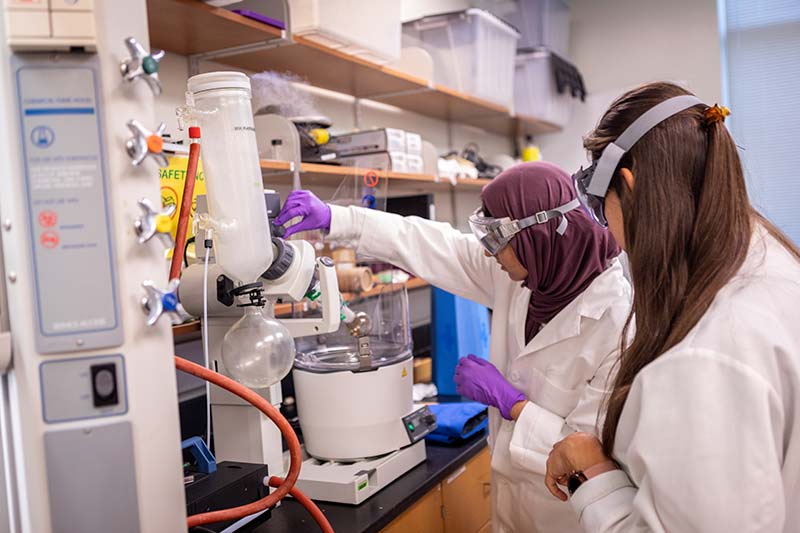
Chemistry Programs
Chemistry Major
Students majoring in chemistry can pursue either a Bachelor of Arts (B.A.) or a Bachelor of Science (B.S.). The B.A. degree is designed to allow maximum flexibility. It is a good option for students treating chemistry as a second major. The B.S. degree has more specific requirements than the major for the B.A. degree.
The B.A. degree requires students to complete 46-49 credit hours, including 37-40 credit hours of core courses and 9 credit hours of elective courses.
The B.S. degree requires students to complete 62-66 credit hours, including 50-52 credit hours of core courses and 12-14 credit hours of elective courses.
Chemical Physics Minor
Students minoring in Chemical Physics are required to complete 19 credit hours of core courses.
Chemistry Minor
Students minoring in Chemistry are required to complete 19 credit hours, including 8 hours of core courses and 11 hours of electives courses.
Dual Degree Engineering Program
A Dual Degree Engineering Program is available to Meredith College students. In this 5-year program, a student can simultaneously receive a Bachelor of Arts degree from Meredith College in Chemistry and a Bachelor of Science in Biological, Biomedical, Chemical, Environmental, or Textile Engineering from NC State University.
Interested students should contact Jennifer Hontz, the director of the Dual Degree Engineering program before registering for the first semester at Meredith College.
Teaching Licensure
Students earning a degree in chemistry are eligible to seek North Carolina teacher licensure to teach middle grades (6-9) science or comprehensive science for secondary education (9-12). The programs are designed to assist individuals in acquiring knowledge and developing skills and dispositions within a learning environment focused on active involvement and integrated learning activities.
Requirements
To complete the middle or secondary grades science teacher education program and earn licensure, students must complete the requirements for their chosen major as well as the following licensure requirements.
Students must be admitted to the Teacher Education Program to enroll.
Refer to the Undergraduate Course Catalogue for official information about licensure requirements.
Why Study Chemistry at Meredith?
- Choose to earn either a Bachelor of Arts or Bachelor of Science degree.
- You may pursue licensure to teach middle grades (6-9) science or comprehensive science for secondary education (9-12).
- You can choose to participate in the Dual Degree Engineering Program.
- You will have the opportunity to build collaborative research partnerships with Meredith faculty and participate in projects in the renowned Research Triangle Park, a hub of research and scientific achievement.
- Scholarships for chemistry majors include the GlaxoSmithKline Women in Science Scholars Program Scholarship, the Elizabeth James Doetterer Scholarship, and the Moore Mixon Family Science Scholarship. Additionally, the STEM Scholars Programs provide a unique opportunity for talented students to pursue careers in science, technology, engineering, and mathematics. Meredith offers two STEM scholarships: the Advancing Women’s Education in STEM Scholars and Paschal Scholars.
- Student organizations for Chemistry majors include the American Chemistry Society and Iota Sigma Pi.
- Examples of student success include
- Briana Petrusa, a Fulbright award recipient who is now a candidate for medical school.
What Can I Do With a Degree in Chemistry?
Internships
Chemistry majors have participated in a variety of undergraduate internship opportunities with innovative research and scientific, technology-focused organizations. Companies where interns have recently been placed include
- GlaxoSmithKline
- Metabolon
- State Bureau of Investigation
- State Department of Public Health
- Novartis
- Progress Energy
- Sensors Safety, Inc.
Careers
A major in chemistry is an excellent stepping stone to careers in the chemical and pharmaceutical industries, engineering, government, environmental agencies, and teaching. Meredith chemistry graduates are employed at numerous companies, including
- Aldagen, Inc.
- Microbiology ES Associate at KBI Biopharma
- Department of Public Instruction of North Carolina
- Argos Therapeutics
According to the U.S. Bureau of Labor Statistics, the median pay for graduates with a physical science degree is $70,000.
Research
As a chemistry major, you’ll have the opportunity to build collaborative research partnerships directly with Meredith faculty and participate in projects in the renowned Research Triangle Park, a hub of research and scientific achievement. Chemistry students may also receive financial awards to present their research projects at local and national conferences. Below is a list of student research and presentations.
Research
- A student worked as part of a team to study DNA Extraction and Regeneration of Tylosema exculentum and Tylosema fassoglensis.
- A student explored a novel chelation method for removing metal contaminants like arsenic and lead from water supplies.
Presentations
Research Presentations at Professional Meetings of the American Chemical Society
- Six undergraduate research students attended and presented at the National American Chemical Society Meeting in New Orleans, La.
Poster Presentations at Celebrating Student Achievement Day
- Sarah Beno, Rachel Serrano and Anum Imran – DNA Extraction and Regeneration of Tylosema esculentum and Tylosema fassoglensis.
- Rodda Ouma – An investigation of the interaction between zinc and the beta amyloid peptide: A possible cause of the senile plaques characteristic of Alzheimer’s disease.
Graduate School
Graduates of Meredith’s chemistry program have gone on to pursue graduate and professional programs. Programs our graduates have attended include
Graduate Programs
Ph.D. Programs
- Chemistry, Duke University
- Chemistry and Biochemistry, University of Northern Illinois
- Chemistry, NC State University
- Chemistry, University of Virginia
- Education, NC State University
Master of Science Programs
- Marine, Earth and Atmospheric Sciences, NC State University
- Clinical Research, Campbell University
- Nutrition, Meredith College
- Environmental Systems – Mathematical Modeling, Humboldt State University
Professional Programs
Medical School
- Yale Medical School, Yale University
- Brody School of Medicine, East Carolina University
- UNC School of Medicine
Pharmacy School
- Eshelman School of Pharmacy, University of North Carolina-Chapel Hill
- College of Pharmacy and Health Science, Campbell University
- College of Pharmacy, University of Kentucky
- South Carolina College of Pharmacy, Medical University of South Carolina
Law School
- Indiana University School of Law, Indianapolis
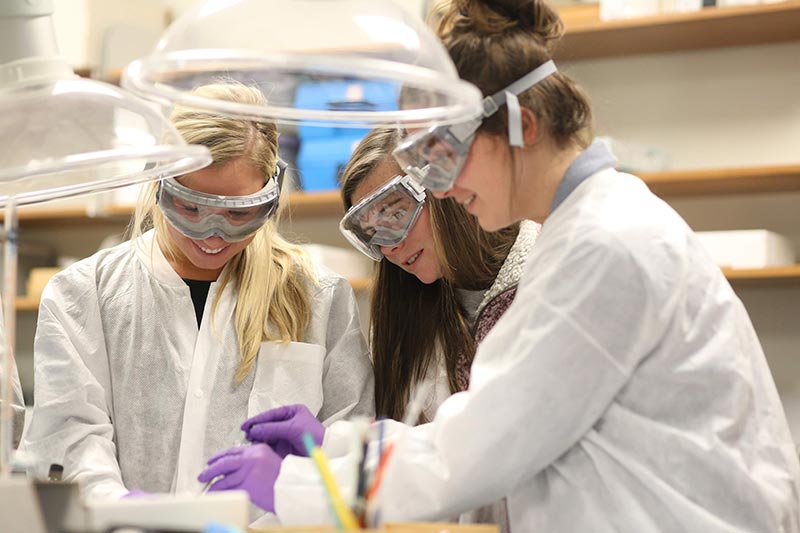
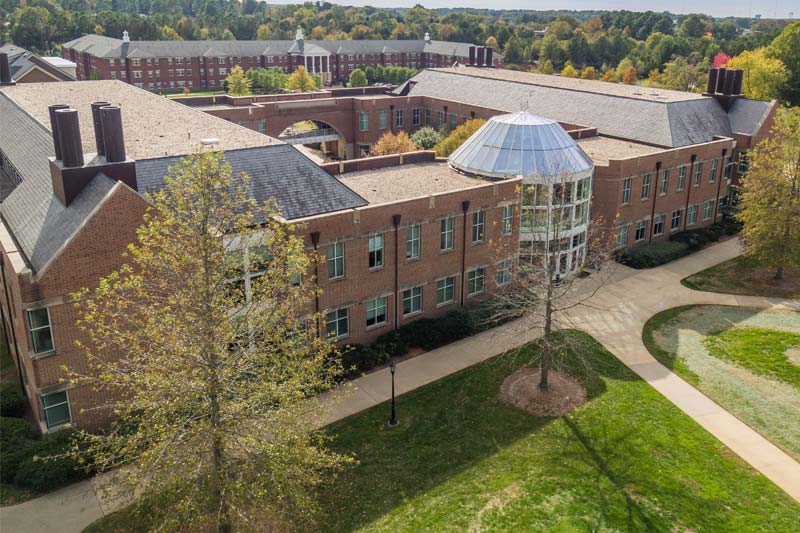
Facilities and Labs
Science courses are housed in the Science and Mathematics Building, which contains 80,000 square feet of learning space, including 13 dedicated research labs that support the needs of ongoing student and faculty research.
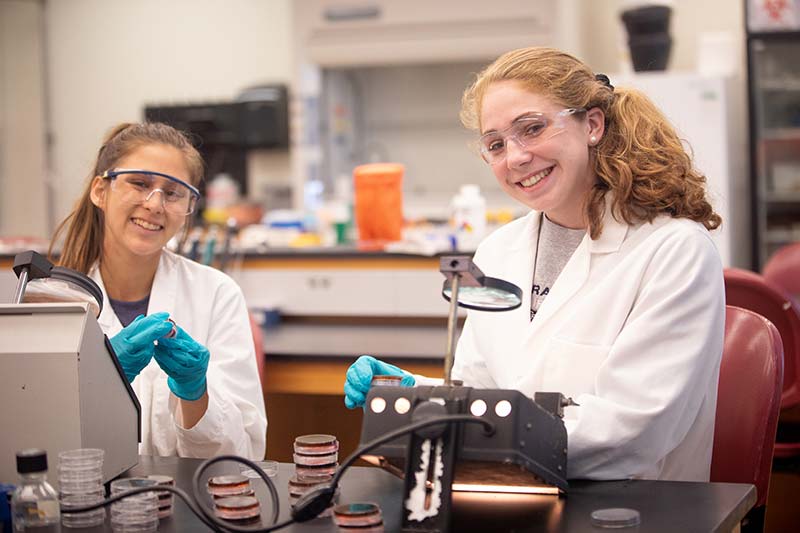
STEM Summer School
Meredith STEM College is an opportunity for rising 10th, 11th, and 12th-grade women to develop their interest in science.

Meredith Legacy Scholar Sierra Moorefield, ’18, brought a passion for learning to every opportunity that came her way in the classroom and the research lab while earning a double major in biology and chemistry.

As a four-year starter on the Meredith softball team and a double major in biology and chemistry, Erica Occena, ’18, has challenged herself to grow and succeed in the future.

Having lived in five countries and attended four schools, one thing Asha Tuli, ’17, has learned is adaptability.
Videos About Meredith’s Chemistry Major
Chemistry News and Events

Three Meredith scholars who were awarded the College’s highest academic honor, the Full-Ride Merit Scholarship, were celebrated on Friday, April 19, 2024, as they prepare to graduate.

Professor of Chemistry Walda Powell presented “Life in Chemistry,” the 2023-24 Faculty Distinguished Lecture, on March 19, 2024. The lecture emphasized how chemistry affects every person’s life.
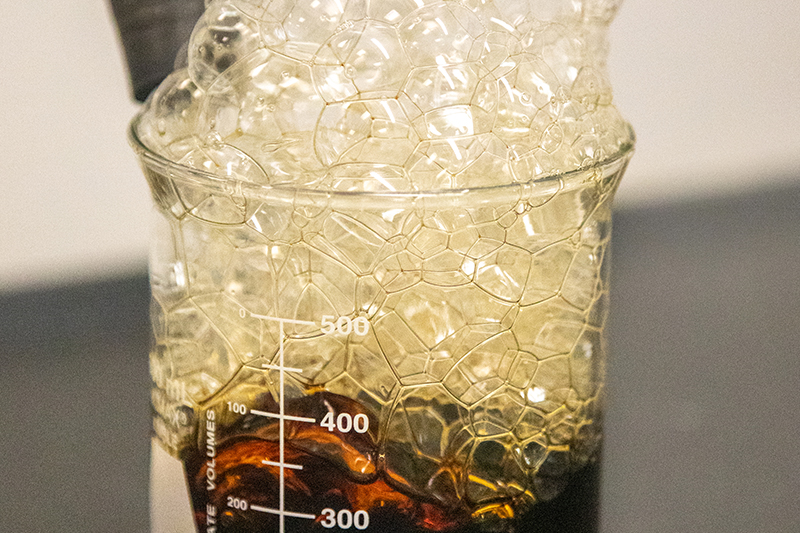
Professor of Chemistry Walda Powell will deliver Meredith College’s Faculty Distinguished Lecture on Tuesday, March 19, 2024, at 7 p.m., in Jones Auditorium. The lecture, “Life in Chemistry,” will focus on Dr. Powell’s own life as a chemist and how chemistry touches every life.
Contact Information
Sasha Ormond
Head, Dept. of Chemistry, Physics, & Geoscience
203 Science/Mathematics Bldg.
(919) 760-2399
ormonda@meredith.edu
Chemistry Physics & Geoscience Department »
School of Natural & Mathematical Sciences »


